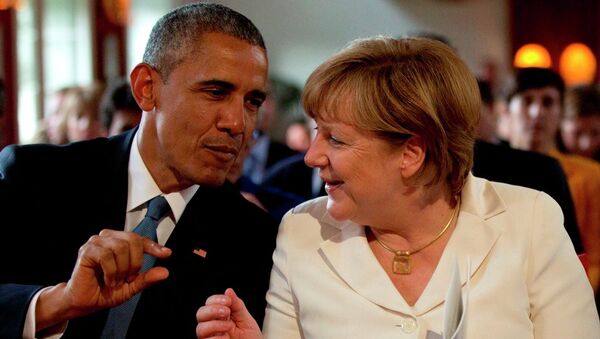However, the TTIP deal has drawn severe criticism for the lack of transparency in the negotiations as well as for the tremendous power it would potentially give to international corporations. The German population is becoming more and more opposed to the deal and fears that it would negatively affect the interests of their country.
"What for Obama in Hanover was a key objective and for Merkel — a praised "ambitious agreement", for the critics of this document is nothing but a complete abandoning of national sovereignty and self-determination on economic and socio-political issues — starting from admission of genetically-modified imports to availability of personal data," Haderer wrote for Sputnik.
According to the expert, the timing of the meeting between the German and US leader was no coincidence: the Ukrainian crisis has led to a situation resembling a new Cold War, a strategic partnership with Saudi Arabia threatens to slip out of the US' hands and China is seeking to implement a project of the New Silk Road which aims to connect the economies of East and Central Asia, Russia and Europe.
"Therefore, the US is trying to withstand China's market expansion on several levels: on the one hand, the growing electronics manufacturers Huawei and ZTE are forced to work under sanctions. On the other hand, Obama is promoting the ratification of the Trans-Pacific Partnership between the United States, Australia and some countries in the Pacific region. In February, 12 countries had signed this agreement," Haderer wrote.
"Taking this into account, the pressure with which a similar agreement is being promoted in the EU is not surprising. But the euphoria with which the Federal Chancellor has agreed to the deal is really striking," the expert wrote.
Nevertheless, German Chancellor Angela Merkel said that she hoped the negotiations on the agreement to expedite trade in goods and services across the Atlantic would be wrapped up soon, possibly by the end of 2016.
"Representatives of European governments should already make a decision on what Europe they want to leave to future generations. Do they want a Europe that in addition to its dependence on the bellicose US foreign policy also depends on it economically? Do they want a union of states under the total control, where citizens are being increasingly deprived of the right to participate in decision-making and, therefore, are turning to radical movements and parties? Or will Europe still return to its intermediary role, which takes into account and respects the wishes of the civilian population? Obama and Merkel have obviously made their choice," Haderer concluded.




